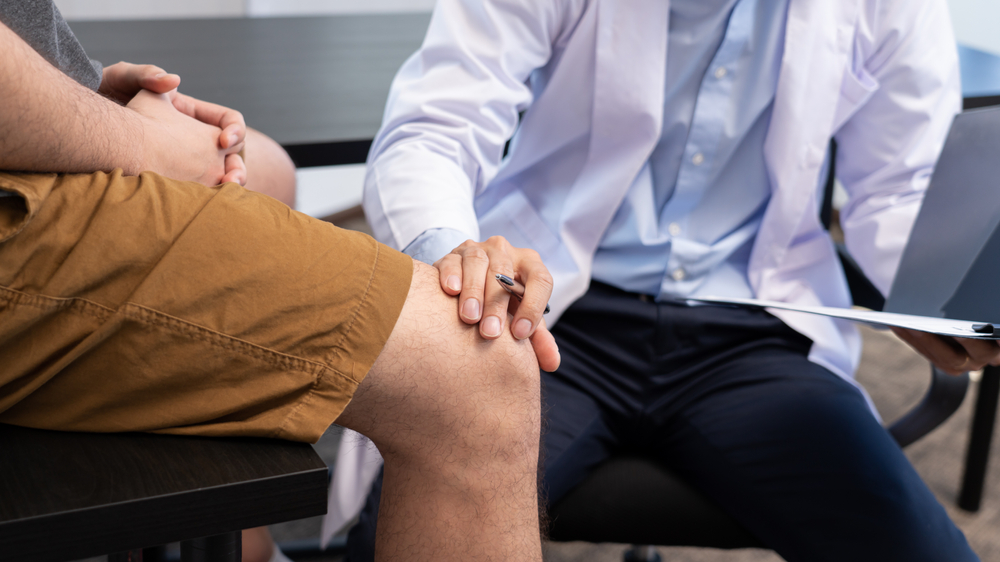Knee pain is a common complaint that affects people of all ages, from young athletes to seniors. While it’s often associated with aging or injuries, the truth is that anyone can experience knee pain due to a variety of factors, including lifestyle, physical activity, and even genetic predisposition. The good news is that many cases of knee pain can be prevented with the right approach. In this blog, we’ll explore practical tips to help you keep your knees healthy, featuring expert advice from Dr. Shivam Shah, recognized as the best orthopedic doctor for knee pain. His insights will guide you in maintaining knee health and avoiding the common pitfalls that lead to chronic pain.
Understanding Knee Pain: Causes and Risk Factors
Before diving into prevention tips, it’s essential to understand the common causes and risk factors for knee pain. Knee pain can result from injuries, such as ligament tears, meniscus tears, and fractures, or from conditions like arthritis, bursitis, and tendinitis. Other risk factors include:
- Age: As we age, the wear and tear on the knee joints can lead to conditions like osteoarthritis.
- Obesity: Excess body weight increases the load on your knees, leading to increased wear and tear on the joints.
- Physical Activity: High-impact activities and sports can lead to knee injuries, especially if proper techniques and precautions are not followed.
- Genetics: Some people are genetically predisposed to knee problems, such as those with a family history of arthritis.
- Occupation: Jobs that involve repetitive knee movements, such as kneeling or heavy lifting, can increase the risk of knee pain.
Best Tips From The Best Orthopedic Doctor
Lifestyle Changes for Healthy Knees
One of the most effective ways to prevent knee pain is through simple lifestyle changes. Dr. Shivam Shah emphasizes the importance of regular exercise, a proper diet, and weight management in keeping knee joints strong and pain-free. “Your knees bear the weight of your entire body, so maintaining a healthy weight is crucial,” says Dr. Shah. “Excess weight puts unnecessary stress on your knees, which can lead to pain and potential injuries.”
- Maintain a Healthy Weight: Excess weight is a significant risk factor for knee pain because it increases the load on your knees, leading to accelerated wear and tear on the joints. By maintaining a healthy weight, you reduce the stress on your knees, helping to prevent pain and the development of conditions like osteoarthritis.
- Balanced Diet: A diet rich in calcium, vitamin D, and omega-3 fatty acids supports bone and joint health. Calcium and vitamin D are crucial for maintaining strong bones, while omega-3 fatty acids, found in fish like salmon, can reduce inflammation in the joints.
- Hydration: Staying hydrated is often overlooked but plays a vital role in joint health. The cartilage in your knees is primarily made of water, and proper hydration ensures that your joints remain well-lubricated, reducing the risk of wear and tear.
Incorporating low-impact exercises, such as swimming, cycling, and walking, can strengthen the muscles around your knees without putting too much strain on the joints. Dr. Shah also recommends engaging in flexibility exercises like yoga and stretching, which help maintain the range of motion in your knees and reduce the risk of injury.
The Role of Proper Exercise
Exercise is essential for preventing knee pain, but it’s important to do it correctly. Dr Shivam Shah robotic knee replacement, advises focusing on exercises that strengthen the quadriceps, hamstrings, and calves. These muscles support your knee joints and can help prevent injuries.
“Strengthening the muscles around the knee provides stability and reduces the likelihood of knee pain,” explains Dr. Shah.
- Quadriceps Strengthening: The quadriceps are the muscles at the front of your thigh, and they play a crucial role in stabilizing the knee. Exercises like leg presses, squats, and leg extensions can help strengthen the quadriceps.
- Hamstring Strengthening: The hamstrings, located at the back of your thigh, are also essential for knee stability. Strengthening exercises like hamstring curls and deadlifts can help support your knee joints.
- Calf Strengthening: Strong calf muscles can reduce the strain on your knees during activities like walking and running. Calf raises and seated calf presses are effective exercises for building calf strength.
However, not all exercises are created equal. High-impact activities like running on hard surfaces or playing sports that involve sudden stops and turns can increase the risk of knee injuries. Dr. Shah suggests opting for controlled, low-impact workouts that build strength and endurance without causing unnecessary stress on the knees.
- Low-Impact Cardio: Activities like swimming, cycling, and using an elliptical machine are excellent for cardiovascular health without putting excessive strain on your knees.
- Stretching and Flexibility: Stretching before and after exercise helps maintain flexibility and reduces the risk of injury. Yoga and Pilates are also beneficial for improving flexibility and strengthening the muscles around the knee.
- Proper Warm-Up and Cool-Down: Warming up before exercise prepares your muscles and joints for the activity ahead, while cooling down helps your body recover and reduces muscle stiffness.
Early Intervention: Catching Problems Before They Escalate
One of the key messages Dr Shivam Shah robotic knee replacement shares is the importance of early intervention. Minor knee pain can be a warning sign of underlying issues that, if left untreated, can lead to more serious problems. Don’t ignore knee pain, no matter how minor it seems,” warns Dr. Shah. “Early intervention can prevent a small issue from becoming a major problem.”
- Listen to Your Body: If you experience knee pain, it’s essential to pay attention to your body’s signals. Ignoring pain or pushing through it can exacerbate the problem and lead to long-term damage.
- Seek Professional Advice: Regular check-ups with an Best orthopedic doctor for knee pain specialist, especially if you experience recurring knee pain, can help catch potential issues early. Dr. Shivam Shah’s clinic, a leading knee replacement hospital in Vadodara, offers comprehensive evaluations to diagnose and treat knee problems before they escalate.
- Rest and Recovery: Rest is an essential component of preventing knee pain. If you’ve been engaging in high-impact activities or feel strain in your knees, giving your body time to recover can prevent further injury.
- Physical Therapy: For those with existing knee pain, physical therapy can help alleviate symptoms and prevent the condition from worsening. A physical therapist can design a customized exercise plan to strengthen the knee and improve flexibility.
Ergonomic Adjustments for Daily Activities
Your daily activities, from sitting at a desk to climbing stairs, can contribute to knee pain if not done correctly. Dr. Shivam Shah advises making ergonomic adjustments to your environment to protect your knees. This includes using supportive chairs, maintaining good posture, and taking breaks to stand and stretch during prolonged periods of sitting.
- Proper Posture: Maintaining good posture while sitting or standing can reduce the strain on your knees. When sitting, keep your feet flat on the ground and your knees at a 90-degree angle. When standing, distribute your weight evenly between both legs.
- Supportive Footwear: Wearing shoes with proper arch support and cushioning can reduce the impact on your knees during daily activities. Avoid high heels and opt for shoes that provide stability and comfort.
- Ergonomic Workstation: If you have a desk job, ensure that your workstation is ergonomically designed. Your chair should support your lower back, and your desk should be at a height that allows you to keep your feet flat on the ground and your knees at a right angle.
- Regular Breaks: Take regular breaks to stand, stretch, and move around, especially if you’re sitting for extended periods. This helps maintain circulation and reduces stiffness in the knees.
For those who are active in sports or physically demanding jobs, wearing proper footwear and using knee supports can further reduce the risk of injury. Dr. Shah stresses the importance of listening to your body and taking preventive measures when you notice discomfort or strain.
The Importance of Proper Nutrition
Nutrition plays a crucial role in maintaining knee health. A balanced diet rich in essential nutrients can help keep your joints strong and reduce the risk of knee pain.
- Calcium and Vitamin D: Calcium and vitamin D are essential for strong bones. Dairy products, leafy greens, and fortified foods are good sources of calcium, while vitamin D can be obtained from sunlight exposure and supplements.
- Omega-3 Fatty Acids: Omega-3 fatty acids have anti-inflammatory properties that can help reduce joint pain. Fatty fish like salmon, flaxseeds, and walnuts are excellent sources of omega-3s.
- Antioxidants: Antioxidants found in fruits and vegetables, such as berries, oranges, and spinach, help protect your joints from damage caused by free radicals.
- Hydration: Proper hydration is vital for joint health. Water helps keep the cartilage in your knees lubricated, reducing friction and preventing wear and tear.
Conclusion
Preventing knee pain is within your control with the right lifestyle choices, proper exercise, and early intervention. As the best orthopedic doctor for knee pain, Dr. Shivam Shah provides invaluable advice on maintaining knee health and avoiding the pitfalls that can lead to chronic pain. By following his expert tips and making thoughtful changes in your daily routine, you can keep your knees healthy and strong for years to come. And if you ever find yourself in need of professional care, remember that Dr Shivam Shah robotic knee replacement’s clinic, a top knee replacement hospital in Vadodara, is equipped with state-of-the-art facilities to help you on your path to recovery.



